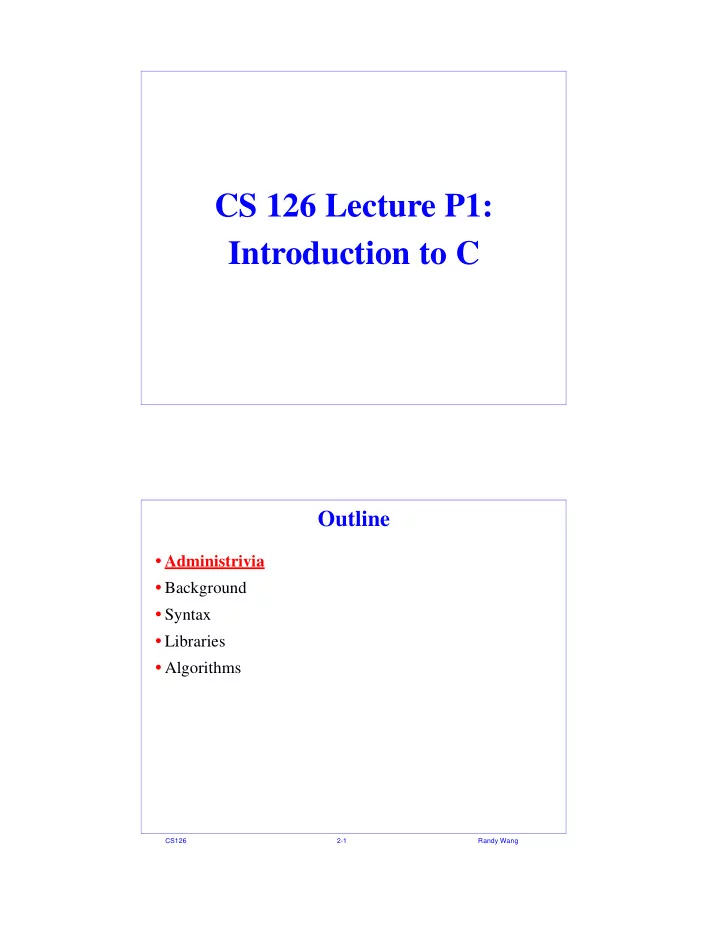

CS 126 Lecture P1: Introduction to C Outline • Administrivia • Background • Syntax • Libraries • Algorithms CS126 2-1 Randy Wang
To Get Started • Visit course web page: - http://www.cs.princeton.edu/courses/cs126 - Keep up with announcements • Get course packet from Pequod (ready now ) • Makeup precept by Lisa ( 7pm, Wednesday ) • Programming assignment 0 due Wednesday night • Get started on readings and exercises • Lab TA schedule on the web • PA1 in course packet has a typo (see web) CS126 2-2 Randy Wang Learning C • No prior programming experience assumed! • Don’t expect to learn C solely from these lectures-- they are just some examples • Readings for C programming - K&R: for people who have had C or other programming - D&D: for beginner programmers ~ first 170 pages for the first two weeks ~ next 100 pages for the third week • Experiment with code fragments on your own CS126 2-3 Randy Wang
Outline • Administrivia • Background • Syntax • Libraries • Algorithms CS126 2-4 Randy Wang Background • Born along with Unix in the early 70s, one of the most popular languages today • Features: - Exposes much of machine details (Remember “abstractions”? C exposes low level abstractions) - Terse syntax • Consequences: - Positive: you can do whatever you want -- flexible and powerful - Negative: you can do whatever you want -- easy to shoot yourself in the foot! CS126 2-5 Randy Wang
Aspects of Learning to Program • Syntax -- like learning English • Algorithms -- like learning to tell a coherent story (not necessarily in English) • Libraries -- like learning to reuse plots written by others • These are quite different learning processes CS126 2-6 Randy Wang Outline • Administrivia • Background • Syntax • Libraries • Algorithms CS126 2-7 Randy Wang
Functions g h f • A C program is a sequence of functions • f: a C function is very much like a math function • g: can have more diverse inputs than you have seen example: numbers, strings, more complex data structures • h: doesn’t have to have outputs - their purpose is “side effects” - like Pascal “procedures” CS126 2-8 Randy Wang Defining a Function output type float input type x f(float x, float y) input nam e { tem porary scratch space x+y f float z; z = x + y; output value return z; y } • First two lines: called “Prototype”, or the “interface” • The rest (enclosed by {}): is the body, or the “implementation” • Remember the concept of abstractions? CS126 2-9 Randy Wang
function body f main f • Remember “abstractions”?
Outline • Administrivia • Background • Syntax • Libraries - Commonly needed codes written for you already - Get an idea of what’s there (look at back of K&R) - When you see a possible use, understand the interface - Another application of abstractions • Algorithms CS126 2-14 Randy Wang
• Sometimes you don’t see a precise match in the library... • See if you can leverage what’s there to accomplish what you want.
Outline • Administrivia • Background • Syntax • Libraries • Algorithms CS126 2-18 Randy Wang Print 9-by-9 random patterns
Top-down Design loop 9 times print a random row at a time loop 9 times print a random element at a time if head print “*” else print “ “ • Break down a big problem into smaller sub problems • Break down small sub problems into smaller subsub ones • Repeat until all details are filled out CS126 2-20 Randy Wang Print one element Print one row Print all rows
Reading Code • Top-down is the use of abstractions • Top-down is how programmers write code • When we read code - First, we pretend to be the computer, and “trace” the execution - In the process of tracing, the goal is to discover/understand the top-down structures (abstractions) CS126 2-22 Randy Wang while I still have money, repeat: make a bet print a star at the “right” place
(marrying previous two programs) Just like the last slide, except that it returns # of trials instead of printing stars Loop for different starting amounts (rows) Try 5 times for each amount (columns) Print the result of each trial (a cell) Experiment [main()] Ruin sequence [doit()] Random bit [rand()]
Recommend
More recommend